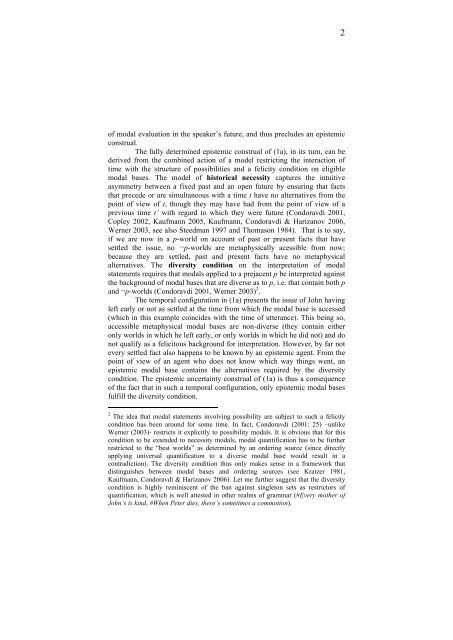On modal tenses and tensed modals - UMR 7023 - CNRS
On modal tenses and tensed modals - UMR 7023 - CNRS
On modal tenses and tensed modals - UMR 7023 - CNRS
Create successful ePaper yourself
Turn your PDF publications into a flip-book with our unique Google optimized e-Paper software.
of <strong>modal</strong> evaluation in the speaker’s future, <strong>and</strong> thus precludes an epistemic<br />
construal.<br />
The fully determined epistemic construal of (1a), in its turn, can be<br />
derived from the combined action of a model restricting the interaction of<br />
time with the structure of possibilities <strong>and</strong> a felicity condition on eligible<br />
<strong>modal</strong> bases. The model of historical necessity captures the intuitive<br />
asymmetry between a fixed past <strong>and</strong> an open future by ensuring that facts<br />
that precede or are simultaneous with a time t have no alternatives from the<br />
point of view of t, though they may have had from the point of view of a<br />
previous time t’ with regard to which they were future (Condoravdi 2001,<br />
Copley 2002, Kaufmann 2005, Kaufmann, Condoravdi & Harizanov 2006,<br />
Werner 2003, see also Steedman 1997 <strong>and</strong> Thomason 1984). That is to say,<br />
if we are now in a p-world on account of past or present facts that have<br />
settled the issue, no ¬p-worlds are metaphysically acessible from now;<br />
because they are settled, past <strong>and</strong> present facts have no metaphysical<br />
alternatives. The diversity condition on the interpretation of <strong>modal</strong><br />
statements requires that <strong>modal</strong>s applied to a prejacent p be interpreted against<br />
the background of <strong>modal</strong> bases that are diverse as to p, i.e. that contain both p<br />
<strong>and</strong> ¬p-worlds (Condoravdi 2001, Werner 2003) 2 .<br />
The temporal configuration in (1a) presents the issue of John having<br />
left early or not as settled at the time from which the <strong>modal</strong> base is accessed<br />
(which in this example coincides with the time of utterance). This being so,<br />
accessible metaphysical <strong>modal</strong> bases are non-diverse (they contain either<br />
only worlds in which he left early, or only worlds in which he did not) <strong>and</strong> do<br />
not qualify as a felicitous background for interpretation. However, by far not<br />
every settled fact also happens to be known by an epistemic agent. From the<br />
point of view of an agent who does not know which way things went, an<br />
epistemic <strong>modal</strong> base contains the alternatives required by the diversity<br />
condition. The epistemic uncertainty construal of (1a) is thus a consequence<br />
of the fact that in such a temporal configuration, only epistemic <strong>modal</strong> bases<br />
fulfill the diversity condition.<br />
2 The idea that <strong>modal</strong> statements involving possibility are subject to such a felicity<br />
condition has been around for some time. In fact, Condoravdi (2001: 25) –unlike<br />
Werner (2003)- restricts it explicitly to possibility <strong>modal</strong>s. It is obvious that for this<br />
condition to be extended to necessity <strong>modal</strong>s, <strong>modal</strong> quantification has to be further<br />
restricted to the “best worlds” as determined by an ordering source (since directly<br />
applying universal quantification to a diverse <strong>modal</strong> base would result in a<br />
contradiction). The diversity condition thus only makes sense in a framework that<br />
distinguishes between <strong>modal</strong> bases <strong>and</strong> ordering sources (see Kratzer 1981,<br />
Kaufmann, Condoravdi & Harizanov 2006). Let me further suggest that the diversity<br />
condition is highly reminiscent of the ban against singleton sets as restrictors of<br />
quantification, which is well attested in other realms of grammar (#Every mother of<br />
John’s is kind, #When Peter dies, there’s sometimes a commotion).<br />
2

















